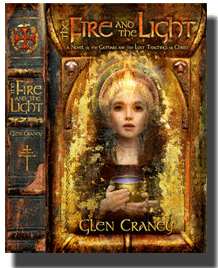
Glen Craney: Dominic Guzman came from a military family in Castile. His defenders will argue that he must be judged in the heat of his time, the Reconquista and Spain’s struggle against the Moors. But if a saint is held to enjoy special inspiration from God, then either Dominic or God has much to answer for. Even Pope Paul II apologized for the Church’s persecution of the so-called heretics. A few years ago, while in Spain, I made a trip to the little village of Caleruega where Dominic was born. In the small museum there, not a word was mentioned of his role in the Albigensian Crusade. An angelic Dominican nun from South America greeted me and offered to answer my questions. I didn’t have the heart to ask her about the glaring omission. I suspect she had never been told.
With the success of Dan Brown and The Da Vinci Code, there’s been lots of speculation about the Holy Grail. Do you have an opinion on what it is?
Glen Craney: I applaud Brown for having the courage and foresight to delve into the subject. I’m also heartened that more people are eager to study and examine for themselves the dogmas and creeds of all religions. That being said, I do not subscribe to the Mary Magdalene/Jesus bloodline theory. I honestly don’t see what difference it would make if a family or secret society had carried on the lineage of Jesus. Siblings in the same family can be so different that you would think them members of two unrelated species. The Cathars would not likely have been concerned with a physical blood line. The Da Vinci Code controversy is a modern phenomenon that seeks to explain in material terms a process that is probably spiritual and esoteric. But in the end it was just a novel, as my story is, and I empathize with Brown because of the unfounded criticism he endured.
In your opinion, what was the "treasure" protected on Montsegur?
Glen Craney: I'll put readers on the path with a question: If the Cathars did not protect something of incalculable value, why would they accept a horrific martyrdom in the thousands rather than recant and deliver up what the Church sought?
Glen Craney: As the historian Zoe Oldenbourg observed, much of the evidence giving the Cathar perspective of the crusade has been lost or destroyed. For a historical novelist, this can be both a blessing and a curse. I've offered my own suppositions in the novel and have taken dramatic license at times. The reader should always keep in mind that this a work of fiction, not academic history. I think it was the French author Simone Weil who said that the victors write history. That observation was certainly true for the medieval Catholic chroniclers of the Albigensian Crusade. I’ve told Fire through the point of view of the Cathars. Testimony on their behalf has been long overdue.

